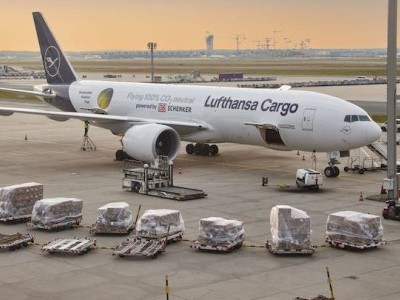January 15 was the closing date for “expressions of interest” in the acquisition of DB Schenker, the logistics and freight forwarding giant owned by German state rail operator, Deutsche Bahn (DB).
The company employs over 76,000 staff at over 1,850 locations in more than 130 countries and posted an operating profit of €1.8 billion ($12.81) in 2022.
At the height of the pandemic a couple of years ago, Schenker was valued at between €15 billion and €20 billion but given that market conditions have deteriorated steadily since then, its sale price has likely fallen to €12 billion($13B) — €15 billion ($16B) — which would still make it the biggest takeover of a logistics group so far this century.
Being the only division within its heavily—indebted parent to be consistently and significantly in the black in recent years has meant that there has been a good deal of hesitation on the part of both the DB Group and the German government as to whether Schenker should be put up for sale.

Dip in Earnings, Impact on Sale Price
According to preliminary figures, Schenker’s operating profit for 2023 will be well down on the previous year’s level but totaling just over €1 billion ($1.08B), with the prospect that it will decrease further in 2024 before moving upwards again.
Schenker’s reduced profitability will result in Deutsche Bahn aggravating its net loss for last year to around €1.2 billion ($1.30B) compared to €230 million ($249.7M) in 2022.
In its official announcement on relinquishing Schenker, the Group said, “The condition for a sale is that it must have apparent economic advantages for Deutsche Bahn in all respects.”
The announcement went on to state: “The international logistics market offers excellent prospects for long-term growth. As one of the world's top four logistics companies, DB Schenker has a solid position within the market. DB Schenker has contributed very positively to the DB Group's economic growth over the years. However, the DB subsidiary will need more capital and flexibility for its growth.”
The DB Group underlined that it would retain all proceeds from a sale, “a large part of which will be used to reduce debt. A sale would significantly accelerate Deutsche Bahn's focus on its core business and the implementation of the Strong Rail strategy.”

Who Will Buy?
The front runners to acquire Schenker have long been considered to be Denmark’s DSV and Schenker’s German counterpart DHL.
German media has also reported interest from ADQ, one of the three sovereign wealth funds in the Emirate of Abu Dhabi, while other names include shipping companies Maersk, MSC and CMA CGM, each of whom are pursuing strategies to become multi-modal logistics ‘integrators’ — largely through acquisitions and financed by the mega profits earned on the back of the spectacular rise in ocean freight rates during the COVID pandemic.
Other candidates in the race are said to include Dubai-based port terminals operator DP World which is also leading a diversification strategy in logistics while UPS has also been mentioned.
Companies that have expressed their interest will receive additional information about Schenker, notably its provisional annual accounts for the 2023 financial year. Based on this data, potential buyers would then be in a position to make a non-binding initial offer.
However, the DB Group has not indicated a specific timeframe for the next stages in the sale process, such as when a short list of candidates will be drawn up and the winning bid announced.
“We are very satisfied with the interest from the market for DB Schenker. As is usually the case, the rest of the process is confidential and we will provide more information accordingly,” a spokesperson told AJOT.

The “Jobs” Factor
Apart from the purchase price, other factors will undoubtedly come into play when it comes to choosing a buyer for Schenker, notably whether jobs in Germany will be preserved following the acquisition. The terms of the sale could also include clauses to the effect that Germany’s state treasury will have a claim on part of the company’s future profitability for a certain period.
If the DB Group and German authorities choose to play the patriotic card, then clearly DHL is in an advantageous position. However, while a merger of two of Germany’s logistics mastodons would appear to be an attractive political option and have the support of public opinion, whether it would make good commercial sense is another matter altogether. Schenker and DHL are direct competitors in a number of business lines and a certain degree of complementarity would need to be demonstrated.
“We continue to believe that DSV is the logical buyer of DB Schenker, given its top-of-the-class approach to inorganic growth and corresponding ability to pay the highest price for the company,” said Tobias Fromme, senior research associate at business consultants, Bernstein, in response to questions from AJOT.
However, the company’s research highlights a potential stumbling block that could seriously scupper a deal. It found that following DSV’s last three major acquisitions – UTi, Panalpina and Agility – the Danish group dismissed around 45% of the new employees as the businesses were integrated. DSV has contested the 45% redundancy rate.
“I’m not sure whether the word notorious was used when describing DSV’s M&A playbook but there is the risk that the German government and the Deutsche Bahn Board would want an employment guarantee for the DB Schenker employees that DSV might not be willing to accept. Still, given the high debt load of Deutsche Bahn and the need of fresh capital to invest in the national railway system, selling Schenker to the highest bidder is the most likely outcome in our view.”
Big M&A deals often raise concerns about the market being increasingly controlled by the major groups at the expense of smaller players. However, should Schenker be acquired by one of its major rivals, the fact that logistics and freight forwarding is such a fragmented space means that post-merger, the combined entity’s share of the global market would probably be not much above 10% and perhaps even less.




